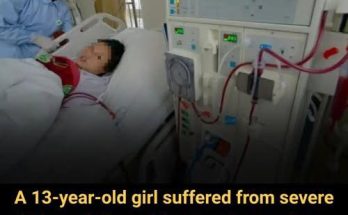In today’s fast-paced world, it’s easy to overlook the people who exist in the quiet shadows. We chase goals, measure success in material things, and often forget the small, powerful moments that define our shared humanity.
But sometimes, a single act of kindness—simple, unseen, and without fanfare—can reach farther than we ever imagine. It can bring dignity where there was none, warmth where there was cold, and purpose where there was only silence.
This is the story of an old woman on Maple Street. But more than that, it’s a reminder that compassion doesn’t need an audience to matter. It just needs someone willing to see.
A Life on the Sidelines, A World Passing By
Maple Street is like many others—lined with houses, trees that bloom in the spring, and sidewalks where children ride their bikes and dogs bark at squirrels. But at the edge of that seemingly ordinary street sat someone most people chose not to see.
An old woman.
No name that anyone knew. No family to call. No routine except sitting quietly on the curb near her building. Her clothes were clean but worn, her gaze distant yet heavy. Some assumed she was just another elderly neighbor passing time outdoors. Others avoided looking at her altogether.
She had no one. And for the longest time, no one had her.
But behind that quiet presence was a truth many didn’t take time to understand: she was lonely, hungry, and largely forgotten by a world too busy to notice.
When Kindness Begins Without Permission
I never set out to become part of her story. I was just her neighbor. My days were full of errands, work, and ordinary life. But each time I saw her sitting alone, something in me stirred. It wasn’t guilt. It was recognition—the kind that grows with age, as we begin to understand how easily a person can fall through the cracks.
I didn’t know her story, but I could feel the absence in her life. One day, I brought her a plate of leftovers. Just a simple meal, nothing fancy. She nodded her thanks but said very little.
The next day, I brought her another. And then another.
Soon it became a rhythm—a plate of food every day for four years.
Not because she asked. Not because I expected anything in return. Just because it felt right.
Quiet Judgments, Louder Purpose
Not everyone understood. I caught glances from neighbors. Some whispered. Others shrugged. A few even questioned why I bothered.
“Isn’t it the city’s job to take care of people like that?” one person asked.
Maybe. But sometimes systems fail. And when they do, neighbors have a chance to become more than bystanders. We can become lifelines.
She never asked for more than what I gave her. Never made demands. Never assumed.
Yet in that small daily ritual, something larger bloomed.
She found comfort in the consistency. I found purpose in the practice. We didn’t need long conversations or grand expressions. Her quiet smile each evening said everything.
When a Stranger Becomes Family
Then one day, she wasn’t there.
The sidewalk where she usually sat was empty. The silence, heavier.
Later that evening, my phone rang. The number was unfamiliar. I hesitated before answering.
A soft voice spoke. “Is this [my name]? This is the county’s office. We found your number in the belongings of a resident. She listed you as her emergency contact.”
My throat tightened. They meant her.
“She passed away peacefully this morning,” the voice said kindly. “But she left something behind. She asked that it be given to you.”
A Letter That Changed Everything
I met a county worker the next day, and she handed me a small, neatly taped box.
There was no money inside. No heirlooms. Just a folded letter with shaky handwriting:
“To the only one who saw me.
You fed me food, but more than that—you fed me dignity. You gave me back my humanity. You gave me a reason to keep living.
Thank you for being my family when the world forgot me.”
I read those words over and over through blurred eyes.
That night, I sat in the same spot where she used to sit. Not out of sadness, but out of reverence—for a woman who had so little, yet left behind something so powerful.
Kindness Doesn’t Need Applause
There were no headlines. No awards. No crowd clapping. Just a quiet street and an empty space that suddenly felt sacred.
I didn’t save her life in the dramatic sense. I didn’t rescue her from a burning building or pay off her debts. But maybe, just maybe, I helped her feel human again.
That’s what kindness does—it restores dignity.
When we talk about acts of compassion, we often imagine grand gestures. But the truth is, true kindness often happens in the margins of life—without noise, without cameras, without even a thank-you.
But its ripples can last forever.
Why This Matters, Especially As We Age
As we grow older, many of us come to realize that the most valuable things in life are not things at all. They’re moments. Connections. The feeling of being seen, remembered, and loved.
Yet aging can be isolating. Friends move away or pass on. Family gets busy. Physical limitations can make even simple things—like shopping or cooking—more difficult.
Too often, older adults become invisible. Not because they don’t matter, but because we forget to look.
This story is a reminder that even a small gesture—bringing someone a meal, checking in, offering a smile—can be the difference between despair and dignity.
It doesn’t require money. It doesn’t require time you don’t have. It just requires paying attention.
The Ripple Effect of One Plate of Food
What started as a plate of leftovers became a lifeline for someone who had none.
But I didn’t just feed her. She fed me too.
She reminded me that life is bigger than schedules and noise. That we all have the power to touch a life—not with grandeur, but with gentleness.
She gave me a reason to slow down. To care more. To see people instead of passing by.
And she left behind a legacy not written in stone, but in ink, on a letter folded carefully in a plain box.
What the Old Woman on Maple Street Taught Me
There’s something sacred about the kind of compassion that isn’t broadcast. The kind that shows up daily. The kind that asks nothing in return.
In our later years, many of us look back and wonder: Did I make a difference?
But maybe the real question is this: Did I choose to see?
Kindness is never wasted.
It’s not measured in applause, recognition, or reward. It’s measured in the quiet impact it leaves behind—in hearts, in memories, in handwritten letters passed on long after we’re gone.
So the next time you walk down your own Maple Street, look around. There might be someone sitting quietly, just waiting to be seen.
And you might be the one who gives them a reason to believe the world still has gentle corners, and people willing to care.



